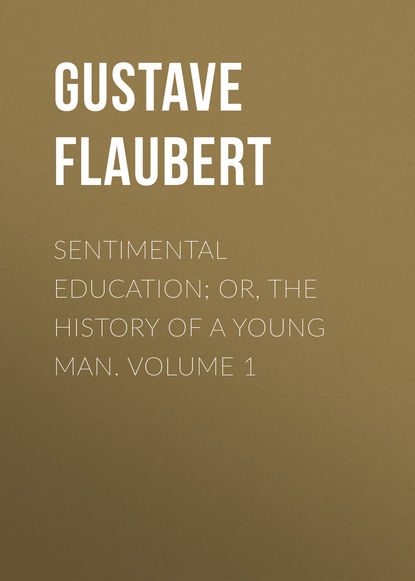 Полная версия
Полная версияSentimental Education; Or, The History of a Young Man. Volume 1
Her husband, on the other hand, must have inherited several estates – Cisy enumerated them: as he visited the Dambreuses, he knew their family history.
Frederick, in order to make himself disagreeable to the other, took a pleasure in contradicting him. He maintained that Madame Dambreuse's maiden name was De Boutron, which proved that she was of a noble family.
"No matter! I'd like to have her equipage!" said the Maréchale, throwing herself back on the armchair.
And the sleeve of her dress, slipping up a little, showed on her left wrist a bracelet adorned with three opals.
Frederick noticed it.
"Look here! why – "
All three looked into one another's faces, and reddened.
The door was cautiously half-opened; the brim of a hat could be seen, and then Hussonnet's profile exhibited itself.
"Pray excuse me if I disturb the lovers!"
But he stopped, astonished at seeing Cisy, and that Cisy had taken his own seat.
Another cover was brought; and, as he was very hungry, he snatched up at random from what remained of the dinner some meat which was in a dish, fruit out of a basket, and drank with one hand while he helped himself with the other, all the time telling them the result of his mission. The two bow-wows had been taken home. Nothing fresh at the house. He had found the cook in the company of a soldier – a fictitious story which he had especially invented for the sake of effect.
The Maréchale took down her cloak from the window-screw. Frederick made a rush towards the bell, calling out to the waiter, who was some distance away:
"A carriage!"
"I have one of my own," said the Vicomte.
"But, Monsieur!"
"Nevertheless, Monsieur!"
And they stared into each other's eyes, both pale and their hands trembling.
At last, the Maréchale took Cisy's arm, and pointing towards the Bohemian seated at the table:
"Pray mind him! He's choking himself. I wouldn't care to let his devotion to my pugs be the cause of his death."
The door closed behind him.
"Well?" said Hussonnet.
"Well, what?"
"I thought – "
"What did you think?"
"Were you not – ?"
He completed the sentence with a gesture.
"Oh! no – never in all my life!"
Hussonnet did not press the matter further.
He had an object in inviting himself to dinner. His journal, – which was no longer called L'Art, but Le Flambart,14 with this epigraph, "Gunners, to your cannons!" – not being at all in a flourishing condition, he had a mind to change it into a weekly review, conducted by himself, without any assistance from Deslauriers. He again referred to the old project and explained his latest plan.
Frederick, probably not understanding what he was talking about, replied with some vague words. Hussonnet snatched up several cigars from the tables, said "Good-bye, old chap," and disappeared.
Frederick called for the bill. It had a long list of items; and the waiter, with his napkin under his arm, was expecting to be paid by Frederick, when another, a sallow-faced individual, who resembled Martinon, came and said to him:
"Beg pardon; they forgot at the bar to add in the charge for the cab."
"What cab?"
"The cab the gentleman took a short time ago for the little dogs."
And the waiter put on a look of gravity, as if he pitied the poor young man. Frederick felt inclined to box the fellow's ears. He gave the waiter the twenty francs' change as a pour-boire.
"Thanks, Monseigneur," said the man with the napkin, bowing low.
1
The French word huissier means a sheriff's officer, or a person whose business it is to serve writs, processes, and legal documents generally. The word "process-server" must not be understood in its colloquial English sense, for in France this business is sometimes a lucrative one. – Translator.
2
Coules, bons vins; femmes, deignez sourire.
3
Toujours lui! lui partout! ou brulante ou glacée, L'image de l'Arnoux.
4
Ah! j'ai l'y ri, j'ai l'y ri. Dans ce gueusard de Paris!
5
About £1,350. – Translator.
6
A little over three miles. – Translator.
7
Mondor was a celebrated Italian charlatan, who, in the seventeenth century, settled in Paris and made a large fortune. – Translator.
8
"Elle reparaîtra, la terrible Assemblée,Dont, après quarante ans, votre tête est troublée,Colosse qui sans peur marche d'un pas puissant."9
This probably refers to the English astronomer of that name. – Translator.
10
The "Porcherons" was the name given to an old quarter of Paris famous for its taverns, situated between the Rue du Faubourg Montmartre and the Rue de Saint-Lazare. – Translator.
11
Henry IV. – Translator.
12
This pun of Hussonnet turns on the double sense of the word "Castille," which not only means a place in Spain, but also an altercation. – Translator.
13
The word "Orléans" means light woollen cloth, and possibly Cisy's pun might be rendered: "Oh! no cloth pudding, please." – Translator.
14
The Blaser.



